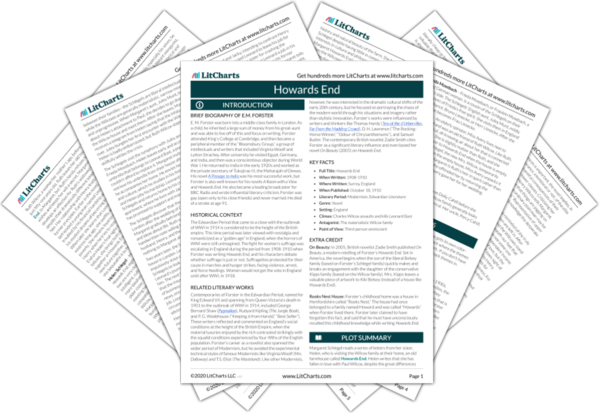Charles Wilcox Quotes in Howards End
They did not make the mistake of handling human affairs in the bulk, but disposed of them item by item, sharply…It is the best—perhaps the only—way of dodging emotion. They were the average human article, and had they considered the note as a whole it would have driven them miserable or mad. Considered item by item, the emotional content was minimised, and all went forward smoothly.
[Charles] described what he believed to have happened. Albert had flattened out a cat, and Miss Schlegel had lost her nerve, as any woman might. She had been got safely into the other car, but when it was in motion had leapt out again, in spite of all that they could say. After walking a little on the road, she had calmed down and had said that she was sorry. His father accepted this explanation, and neither knew that Margaret had artfully prepared the way for it. It fitted in too well with their view of feminine nature.
Here men had been up since dawn. Their hours were ruled, not by a London office, but by the movements of the crops and the sun…They are England’s hope…
At the chalk pit a motor passed [Leonard]. In it was another type, whom Nature favours—the Imperial. Healthy, ever in motion, it hopes to inherit the earth. It breeds as quickly as the yeoman, and as soundly; strong is the temptation to acclaim it as a super-yeoman, who carries his country’s virtue overseas. But the Imperialist is not what he thinks or seems. He is a destroyer.
“You go on as if I didn’t know my own mind,” said Mr. Wilcox fretfully. Charles hardened his mouth. “You young fellows’ one idea is to get into a motor. I tell you, I want to walk; I’m very fond of walking.”
…Charles did not like it; he was uneasy about his father, who did not seem himself this morning. There was a petulant touch about him—more like a woman. Could it be that he was growing old? The Wilcoxes were not lacking in affection; they had it royally, but they did not know how to use it.

Charles Wilcox Quotes in Howards End
They did not make the mistake of handling human affairs in the bulk, but disposed of them item by item, sharply…It is the best—perhaps the only—way of dodging emotion. They were the average human article, and had they considered the note as a whole it would have driven them miserable or mad. Considered item by item, the emotional content was minimised, and all went forward smoothly.
[Charles] described what he believed to have happened. Albert had flattened out a cat, and Miss Schlegel had lost her nerve, as any woman might. She had been got safely into the other car, but when it was in motion had leapt out again, in spite of all that they could say. After walking a little on the road, she had calmed down and had said that she was sorry. His father accepted this explanation, and neither knew that Margaret had artfully prepared the way for it. It fitted in too well with their view of feminine nature.
Here men had been up since dawn. Their hours were ruled, not by a London office, but by the movements of the crops and the sun…They are England’s hope…
At the chalk pit a motor passed [Leonard]. In it was another type, whom Nature favours—the Imperial. Healthy, ever in motion, it hopes to inherit the earth. It breeds as quickly as the yeoman, and as soundly; strong is the temptation to acclaim it as a super-yeoman, who carries his country’s virtue overseas. But the Imperialist is not what he thinks or seems. He is a destroyer.
“You go on as if I didn’t know my own mind,” said Mr. Wilcox fretfully. Charles hardened his mouth. “You young fellows’ one idea is to get into a motor. I tell you, I want to walk; I’m very fond of walking.”
…Charles did not like it; he was uneasy about his father, who did not seem himself this morning. There was a petulant touch about him—more like a woman. Could it be that he was growing old? The Wilcoxes were not lacking in affection; they had it royally, but they did not know how to use it.











